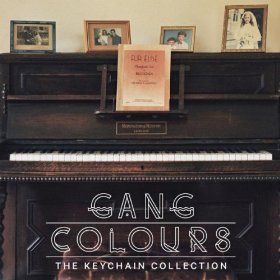Ok, let’s set the record straight here. Admittedly, the bloodline connecting what began as deep UK garage and the likes of Will Ozanne is becoming spiderweb thin. ‘Post-dubstep’ by title, but closer to what might previously have been called ambient electronica, it seems the James Blake hit-squad have a new bête noire in Ozanne, who under the name Gang Colours trades in the type of tactile electro-acoustic languor that sets teeth on edge all across South London. But while the detractors have a good case, acts like Gang Colours warrant your appraisal. In fact, they deserve to be celebrated.
Just as Coki saw a new model for heavy urban music, and Katy B a new pop form, Burial saw in garage and dubstep his own kind of secular spiritualism – music for night-buses, if you like. That particular strain was then extrapolated on by James Blake and various others – Active Child, How To Dress Well, and Gang Colours amongst them. It’s re-imagined as soul by Blake, where in Gang Colours’ case it becomes a kind of devotional dreamstep. As with every great pop possibility, dubstep harbours a multitude of sub-ideas, which have been interpreted from ever possible angle. Where Blake went wrong was his merging of dubstep with a folk-troubadour’s song-structure – with introspection becoming a cloying self-indulgence, a kind of timid bass version of M.O.R. Ozanne, whose music is more track-based, manages to dodge that particular bullet. If Burial was a memory of rave, Gang Colours is closer to a suburbanite’s memory of Burial. But Ozanne’s brand of tentative indiestep is a new form of music in a landscape of few, and a still-evolving artform. And The Keychain Selection deserves special treatment because, in its field, it’s somewhat of a zenith.
As suggested by his punning pseudonym, Ozanne filters urban life through the colouring influence of old-timey naturalism, pitting the real against the unreal, and the mechanical against the organic. The Keychain Selection‘s faintness proves an unlikely base for deceptively evocative music. It listens like seeing shapes in clouds. Brushing against his trusty piano is extraneous recording disturbance – the creaking of a piano chair, the suggestion of space over and about the ivories – while skeletal beats spit and knot against synths. ‘Satie’n’B’ isn’t a bad description, only with the air of cerebral experimentation replaced with bluesy warmth.
With the kinetic micro-garage of his first EP jettisoned in favour of space and stillness, it makes sense that Laurie Anderson is a fan of Ozanne’s music. Opener ‘Heavy Petting’ intertwines three types of voice distortion with a cosmic sheen, bringing to mind Space Dimension Controller, until the spacey vibe jumps swiftly back into an inner-city backdrop. He’s just as effective when the pace picks up, on ‘Botley in Bloom’ and ‘Pebble Beach’. The former rattles like drum & bass done by John Cale’s, while the latter, Ozanne’s busiest track, combines snare tics, voice clips and parping synths into a quiet storm. Mount Kimbie would probably approve. Under scrutiny, these tracks offer something quite distinct, something never quite seen before.
Where the Brighton producer excels is at the very far end of the spectrum, where dubstep is just an echo under dusty chamber pop. The mournful ‘Tissue & Fevers’ hangs on an insistent piano fragment, while tiny spangles of urban music glance off its rich backdrop: tin-on-tin drums, pin-drop synths and pitched-down vocals that form gentle melodies. With its slightly magical feel, it’s spirit-ridden in a different way to Scuba or Burial. The same approach pays dividends on highlight ‘I Don’t Want You Calling’. The piano riff, abandoned early on, is haunting enough to affect the ensuing to-and-fro of sibilant effects and complex drum patterns. When the piano-line picks up again later, it’s a taste of ambient ecstasy.



